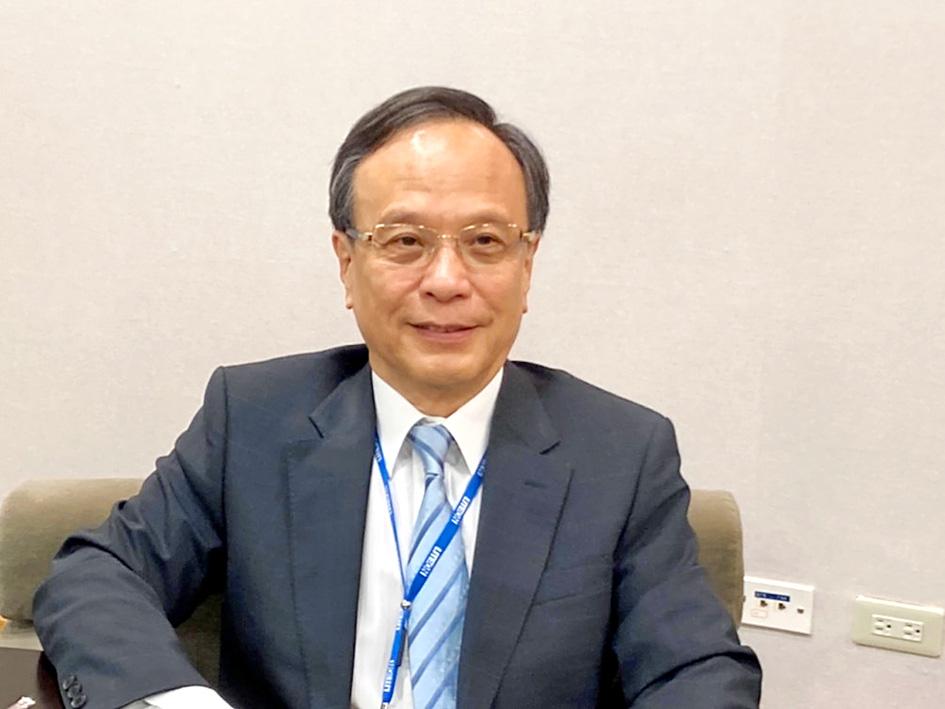Electronic component manufacturer Lite-On Technology Corp (光寶科技) yesterday gave a hazy outlook for business in the second half of the year due to the COVID-19 pandemic.
“From what we know, the coronavirus is still spreading, with new cases in Beijing, as well as in the US and South America… There is a lot of uncertainty which is fostering [economic] instability from a global perspective,” Lite-On vice chairman and chief operating officer Warren Chen (陳廣中) told a news conference after the company’s annual shareholders’ meeting in Taipei.
Although Lite-On has good order visibility for the third quarter, Chen expressed doubts about its future performance.

Photo: Chen Jou-chen, Taipei Times
“We can no longer rely on clients’ orders to predict market demand,” as clients could “easily delay or cancel” orders, Chen said.
The third quarter is usually the high season for electronics, but given the prevailing uncertainty, Chen forecast a year-on-year decline in sales in the second half of the year.
“Nevertheless, the second half would be better than the first half, as we would have more working days,” he said.
With production and shipments hampered by the COVID-19 outbreak in China, Lite-On’s first-quarter sales dropped 20.88 percent annually to NT$32.58 billion (US$1.09 billion).
Thanks to strong shipments of power supplies and other electronic components for PCs, servers, and networking and communications devices, the company reported sales of NT$13.75 billion in April, up 1.57 percent from a year earlier.
However, Lite-On saw sales plummet again by 7.3 percent year-on-year last month, as demand from the US shrank.
With the ongoing protests and high unemployment in the US, “it would be a long time before business returns to normal,” Chen said, adding that a full recovery is unlikely before the end of the year.
Lite-On has resumed operations at its plants in Mexico and Brazil, while its Indian plant remains partially closed, Chen said.
Its production sites in Kaohsiung, Thailand and Vietnam have not been affected by the pandemic, he added.
Focusing on shifting its production out of China, Chen said that Lite-On expects to ship about 20 percent of its total production — up from 15 percent at present — from these sites by the end of the year.
The company’s shareholders yesterday approved a cash dividend distribution plan of NT$3.2 per common share, representing a payout ratio of 79 percent based on earnings per share of NT$4.03 last year.

NEW IDENTITY: Known for its software, India has expanded into hardware, with its semiconductor industry growing from US$38bn in 2023 to US$45bn to US$50bn India on Saturday inaugurated its first semiconductor assembly and test facility, a milestone in the government’s push to reduce dependence on foreign chipmakers and stake a claim in a sector dominated by China. Indian Prime Minister Narendra Modi opened US firm Micron Technology Inc’s semiconductor assembly, test and packaging unit in his home state of Gujarat, hailing the “dawn of a new era” for India’s technology ambitions. “When young Indians look back in the future, they will see this decade as the turning point in our tech future,” Modi told the event, which was broadcast on his YouTube channel. The plant would convert

‘SEISMIC SHIFT’: The researcher forecast there would be about 1.1 billion mobile shipments this year, down from 1.26 billion the prior year and erasing years of gains The global smartphone market is expected to contract 12.9 percent this year due to the unprecedented memorychip shortage, marking “a crisis like no other,” researcher International Data Corp (IDC) said. The new forecast, a dramatic revision down from earlier estimates, gives the latest accounting of the ongoing memory crunch that is affecting every corner of the electronics industry. The demand for advanced memory to power artificial intelligence (AI) tasks has drained global supply until well into next year and jeopardizes the business model of many smartphone makers. IDC forecast about 1.1 billion mobile shipments this year, down from 1.26 billion the prior

People stand in a Pokemon store in Tokyo on Thursday. One of the world highest-grossing franchises is celebrated its 30th anniversary yesterday.

Zimbabwe’s ban on raw lithium exports is forcing Chinese miners to rethink their strategy, speeding up plans to process the metal locally instead of shipping it to China’s vast rechargeable battery industry. The country is Africa’s largest lithium producer and has one of the world’s largest reserves, according to the US Geological Survey (USGS). Zimbabwe already banned the export of lithium ore in 2022 and last year announced it would halt exports of lithium concentrates from January next year. However, on Wednesday it imposed the ban with immediate effect, leaving unclear what the lithium mining sector would do in the